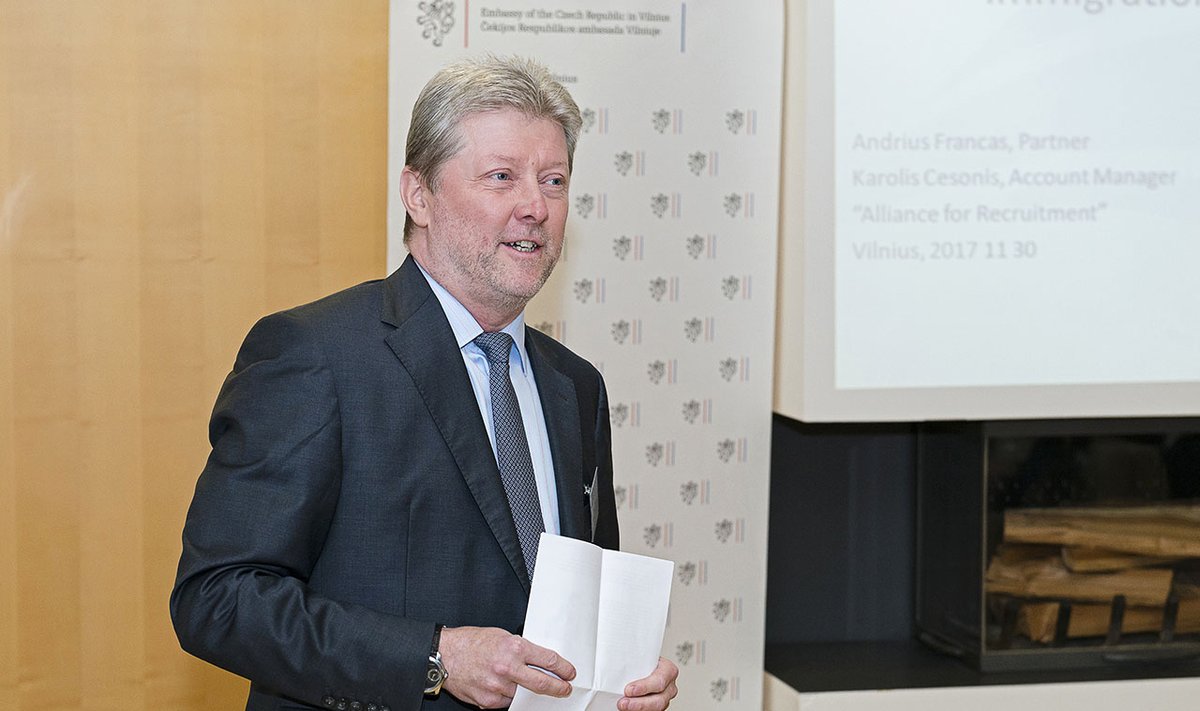Ambassador of the Czech Republic to Lithuania, Bohumil Mazánek, welcomed the guests to the Embassy and introduced the two speakers, Andrius Francas, partner at Alliance for Recruitment and account manager Karolis Česonis. Mr Francas and Mr Česonis share shared their insights and tips with members of the European Business Network (EBN).
"We have at the moment a competitive labour market and the market is driven by candidates' decisions. The candidates can often choose between two or even three offers from different companies. Companies should take into account that the demand for specialists is constantly rising," says Mr. Česonis. "They should stop looking for the perfect candidate because, trust me on this, the perfect candidate does not exist. You should hire the candidate that best matches your requirements and invest into their growth in your company."
As a rapidly developing economy, Lithuania has a growing demand for specialists and employees in many sectors, keeping the unemployment rate at a relatively low level of 8.1%. At the same time, the country leads the European Union in net emigration, losing working-age population every year. "Lithuania is very good at training doctors, only it is not training doctors for itself, but for Norway, Britain, Germany," Mr. Francas gives an example.
While the government keeps declaring efforts to reverse migration as its top priority ("What will we do? We will create a new organization and hire ten new people," Mr. Francas satirizes politicians' usual modus operandi), there is still little in the way of consistent immigration policy, save for initiatives encouraging Lithuanian expatriates to return. Migrants coming to work to Lithuania are few in numbers and by far the largest share of them ends up as long distance truck drivers. Not exactly helpful for high-skill industries that the country purportedly seeks to develop.
Bert van der Lingen, the Dutch Ambassador in Lithuania, noted that about 1,000 Lithuanian students currently studied in universities in the Netherlands, many of them pursuing degrees in engineering and economics, and would be ideal candidates for Dutch companies investing in Lithuania. The challenge, he added, was reaching them.
While Lithuania should indeed seek to attract expatriates and foreigners from the EU, Mr. Francas believes that it should focus its efforts on a low-hanging fruit, namely, migrants from neighbouring Belarus. While Belarusians are coming to Vilnius to work in the budding gaming industry (helped by the Startup Visa that Lithuania introduced following the successful example of the Netherlands), many local companies seem fearful of the language barrier as the young generation of Lithuanians no longer speak Russian, Mr. Francas says. "But the obstacle is in our heads more than in reality – while travelling, you can communicate with people without any knowledge of their language. Why should this be any different," he adds.
Under such circumstances, employers need to adjust their tactics and work harder to persuade employees to come and work for them. Being responsive to their individual needs, listening to employees' opinions and incorporating them into companies' long-term strategies, and, importantly, not sending work-related emails after office hours are some of the tips bosses could take note of. Being socially responsible, dutifully paying taxes, defining company values and genuinely sticking to them are also methods that help create a corporate culture attractive to potential employees.
"Employees want to work for companies with a long-term perspective; they want to see that the companies care for them and not just profits. What happens is that if, for instance, you look at the GDP of Lithuania as compared to Estonia, and it is already a little bigger in purchasing power terms. But can I feel it in my pocket? Not necessarily. So who is being greedy? Where does that money go to? You, the employers, have that money. Why don't you share?" Mr Francas says.
The presentation on the state of the labour market and immigration was part of their monthly presentations organised by European Business Network, EBN.
